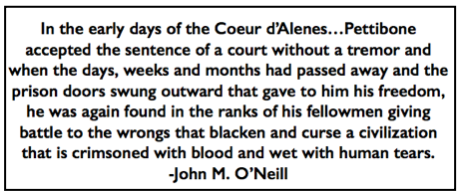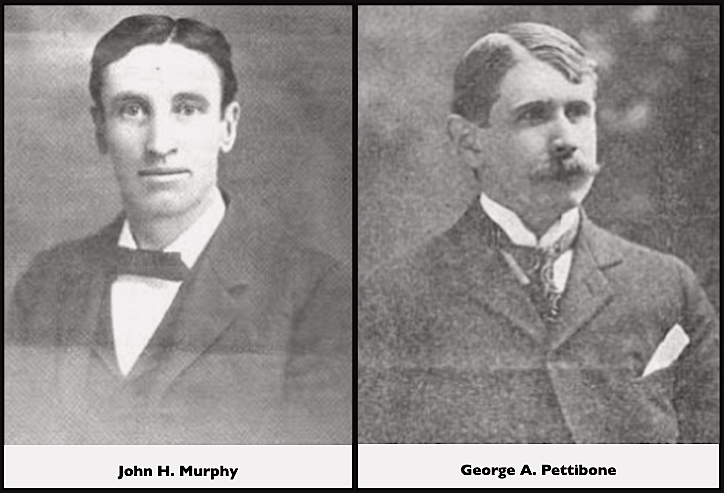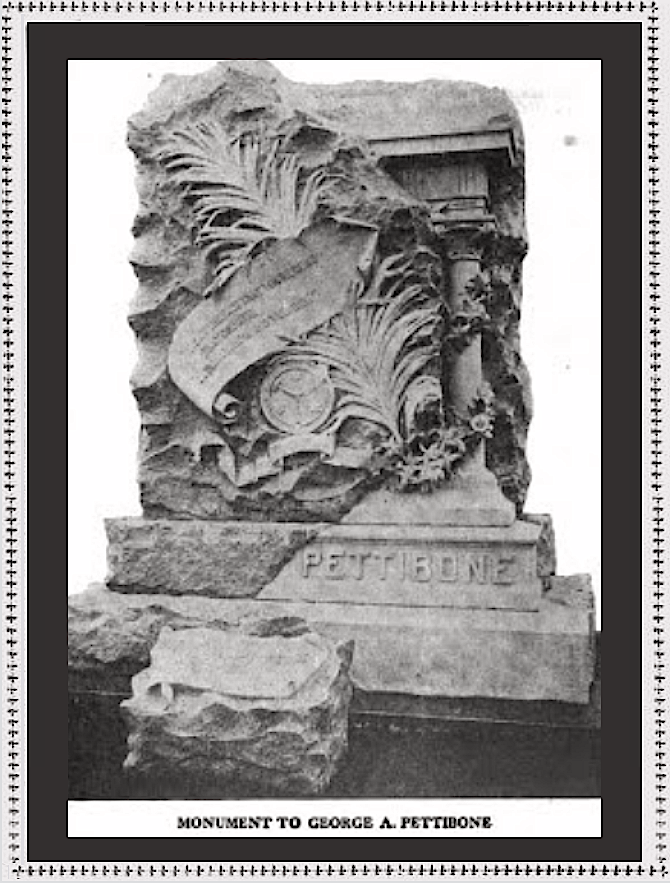 ———-
———-
Hellraisers Journal – Saturday August 7, 1909
Denver, Colorado – Monuments for Murphy and Pettibone Dedicated, Part II
From The Miners Magazine of August 5, 1909:
Monument to Murphy and Pettibone Dedicated July 24th.
[Part II]
—–
—–Judge Hynes in a neat address then introduced John M. O’Neill, editor of the Miners’ Magazine, who delivered the following address:
Ladies and Gentlemen, Members of Organized Labor and Delegates to the Western Federation of Miners:
We have gathered here today to dedicate monuments to the memory of two men, who in life entwined themselves in the hearts of men and women who are scanning with yearning eyes the distant horizon and watching for the faint gleams of that glad morning that shall usher in a civilization that bequeathes to humanity the priceless heritage of industrial liberty. These monuments are the generous gifts of men who mourned the cruel summons of the grim messengers of death that snatched from life’s arena men whose deathless devotion and loyalty to the eternal principles of justice, made their names immortal in the labor movement of Western America. They did not come from the gory field of battle bearing victories that were baptized in human blood. They were not crowned with achievements won amid the fire and smoke of shot and shell, but they were soldiers in that great army of the world’s struggling millions that is slowly but surely marching onward toward the goal of economic freedom.
Neither of these men, whose memory we honor today, came into the world the petted heirs of palatial homes. Their ancestry boasted of no bank accounts and no broad acres, but their parentage was of that noble mould of citizenship that makes this old earth richer and leaves behind a posterity whose noble traits of character challenged the admiration of their fellowmen.[Working-Class Heroes]
In the year 1908, the last chapter in the lives of these two men was written, and now in the year 1909, we are gathered at their graves to pay our tribute of respect and to testify to the worth and merit of men who dared to brave the sneering lip and the frowning brow in defense of a class whose wails of misery are heard in every nation on earth.
[John H. Murphy]
John H. Murphy for years, was the general attorney of the Brotherhood of Locomotive Firemen and the Western Federation of Miners. As a lawyer, he was brilliant and the legal profession recognized in him a giant mind that was equipped for battle in the highest courts of the land. John H. Murphy, as a boy, tasted but little of the luxuries of life. He had not the means to enter the classic halls of famed institutions of learning, but he had an indomitable will and an intellect that flashed with the sparkle of a diamond, and with these inherited gifts he faced the world to fight the battle of life. In his early life we see him on the locomotive clad in jumper and overalls feeding the horse of iron and steel, but on his features, bathed in sweat and grime, could be discerned an aspiration “to climb to loftier heights,” where he could render more valuable service in the great struggle for human rights.
When his associates and companions in the railway service were wrapped in sleep endeavoring to recuperate their exhausted energies for the toil of another day, John H. Murphy, the fireman, was “burning the midnight oil” and storing away in the mental chambers of his brain a knowledge of the law that made him in after years a David of the Common people before the courts of this country. Blacklisted during the great strike of the American Railway Union of 1894, and having felt the relentless despotism of an avenging corporation, he realize more than ever that labor stood in need of advocates in judicial tribunals who would speak with tongues of fire, and with this realization, he redoubled his energies to become a Spartacus to give battle for labor in the temples of justice.
More than a decade ago the legislature of Utah passed an eight-hour law and immediately the mine owners and the corporate interests decreed that the law must be assassinated by the judicial dagger on the grounds that the law was in conflict with the constitution of the State. Murphy, the fireman, was now the lawyer, and he stripped for the fray to give the best that was in him for the man who toiled long hours in the poisoned dungeons of the earth. At that time organized labor had no corpulent treasury, but Murphy was actuated by a higher and nobler incentive than a sordid appetite for fees, and with a courage that knew no surrender or defeat, he fought that battle in the courts of Utah until the highest tribunal of the State handed down a decision proclaiming the constitutionality of the eight-hour law.
But the enemies of labor did not accept the decision of the Supreme Court of the State of Utah, but appealed the case to the Supreme Court of the United States, and before the robed judiciary at the nation’s capitol, the dauntless, young attorney faced an array of legal talent that must have blanched his cheek as he felt the magnitude of the battle in which he was engaged. But Murphy was undismayed. He knew that he was pleading for the bone and brawn of a nation and he knew that the cause in which he had consecrated the efforts of his life, was grounded on the bed-rock of eternal justice. His heart and soul became aflame and the irresistible logic that streamed from his lips swept before it like an avalanche, the winged flights of oratory that soared from the silvery tongues of corporation-paid attorneys. The firemen lawyer dazzled the high-priced attorneys with the brilliancy of his genius and when the smoke of battle had cleared away, the eight-hour law of the State of Utah wore the constitutional crown of the Supreme Court of the United States. Murphy had measured steel with the giants of the legal profession and his prowess as an adversary in the judicial arena could no longer be questioned by the brainiest disciples of Blackstone. He had won a battle that stamped him as a lawyer and the miners of the West looked upon this rising, young attorney as a man who was destined to leave “footprints on the sands of time.”
After his victory in the Supreme Court of the United States, he gave almost his undivided attention to the wrongs of labor and became the framer of almost every eight-hour measure that graces the statute books of the Western States. The eight-hour laws of Utah, Montana Nevada, Arizona and Missouri were due to his tireless energies and before he closed his eyes in death he had earned the enviable title: “Eight-hour Murphy.”
But while we admired his clear, analytical brain and valued his counsel in the stormy days of labor’s battles, yet, there was something grander in the noble nature of the dead lawyer that appealed to us more forcibly than all the genius of his ability, and it was his matchless courage, his fealty to truth and his unfaltering devotion to the cause of right.
On the 17th of February, 1906, there was consummated one of the foulest plots that was ever hatched to blacken the escutcheon of the labor movement of this country. In the dark hours of the night when honest men and women were in their homes, there stole from the conspiring den of a detective agency a coterie of professional body-snatchers, and these human blood-hounds, backed by the governors of two states, kidnapped three men from their homes and spirited them away on a special train to be tried for the murder of a man who had been assassinated by the hireling of conspirators who yearned to place the brand of Cain on the brow of innocent men and commit murder under forms of law.
John H. Murphy was then an invalid. His wasted frame and emaciated face told his dearest friends that he was traveling rapidly “towards that bourne whence no traveler returns.” But with the ashen hue of death upon his brow and with the knowledge that he was courting death in wending his way to Boise, Idaho, to attend the great conspiracy trial, yet he flinched not from what he believed to be his duty and when the press of a nation heralded the opening of the great criminal farce in the Capitol City of the “Gem of the Rockies,” Murphy stood among the brilliant array of lawyers, giving the efforts of his waning life in a battle to snatch innocent men from an ignominious death upon a scaffold.
The history of that great trial need not be repeated here, but when the verdict of twelve men proclaimed the innocence of one of the men whom conspirators had decreed should dangle at the end of a rope, the dying lawyer wept for joy because he realized that the organization, for which he had struggled, had risen above the clouds of calumny and stood vindicated in the minds of the honest men and women of a continent. He lived to see the foul conspiracy against the Western Federation of Miners shattered into fragments and when he breathed his last on the 3rd of March, 1908, we mourned the loss of a man whose brilliancy, courage and loyalty are treasured in the hearts of men who honored and revered him as a “prince among men,” worthy of being recognized as one of “the noblest works of God.”
[George A. Pettibone]
But let us now turn our thoughts to the other man whose life went out, crushed through the persecution of combinations whose hate was only appeased when the brave and noble soul took its flight from the wasted tenement of clay. I had the esteemed honor of being numbered among his friends and stood beside the open grave on the afternoon of the 5th of last August to speak a few words in memory of my friend, the man who looked upon life and death with a smile upon his lips. On that occasion when I gazed into the grave and looked upon the casket that held the mortal remains of George A. Pettibone, and when I beheld the coffin lowered into the bosom of the earth, there rushed through my mind chapters of human history that were written in tears, and those chapters in the life of my friend and brother in the great cause of humanity, almost stilled the heart and palsied the tongue, for words would not come to crown his memory with that tribute which I longed to pay to a man whose peerless honor and unswerving fidelity to the class to which he belonged, made him a Hercules in the battle for man’s emancipation.
George A. Pettibone came to the West with the blush of young manhood upon his cheek. He had felt the weight of the iron yoke of corporate tyranny in his Eastern home and his heart yearned for a broader freedom, and feeling that organized greed had not yet shackled liberty on the summits of the Western mountains, he turned his face to the setting sun and wended his way towards the Pacific.
In the early days of the Coeur d’Alenes we see him allied with his fellowmen in a struggle to wrest better conditions for the man who wielded the pick and hammer in the mines. In that struggle he wounded the dignity of a federal court and because he refused to be come a slave to an injunction, the Caesar upon the bench decreed that Pettibone should feel the sting of the judicial lash wielded by an ermined czar in a “temple of justice.”
But Pettibone accepted the sentence of a court without a tremor and when the days, weeks and months had passed away and the prison doors swung outward that gave to him his freedom, he was again found in the ranks of his fellowmen giving battle to the wrongs that blacken and curse a civilization that is crimsoned with blood and wet with human tears.
The dead man was one of the selected victims of the conspiracy of 1906, and though the conspirators failed to tarnish his memory or place upon his brow the brand of Cain, yet they held him behind the walls of a bastile until death marked him for the grave. But when death was dimming the lustre in his eye and had chased the hue of health from his cheek he demanded to hear the testimony of the hired, professional perjurers because he knew that if the last vestige of justice had not yet fled from a judicial tribunal, a jury of his peers would bring in a verdict that would strangle the plot of the money-bought bloodhounds who had conspired with their paymasters to send him to the scaffold. The verdict was rendered, the honor of Pettibone was vindicated in the courts and this monument that has been unveiled today and which has been built by the dimes and dollars of those who knew him best, is a vindication that will plead his innocence to the unborn generations that are yet to come.
The character and traits of Pettibone can be well delineated when we remember that the following was his favorite poem:
Did you tackle that trouble that came your way
With a resolute heart and cheerful?
Or hide your face from the light of day
With a craven soul and fearful?
Oh, a trouble’s a ton, or a trouble’s an ounce
Or trouble is what you make it,
And it isn’t the fact that you’re hurt that counts,
But only how did you take it?You are beaten to earth? Well, well, what’s that?
Come up with a smiling face;
It’s nothing against you to fall down flat,
But to lie there—that’s disgrace.
The harder you’re thrown, why the higher you bounce;
Be proud of your blackened eye!
It isn’t the fact that you’re licked that counts,
It’s how did you fight—and why?And though you be done to the death, what then
If you battled the best you could,
If you played your part in the world of men,
Why, the Critic will call it good.
Death comes with a crawl, or comes with a pounce,
And whether he’s slow or spry,
It isn’t the fact that you’re dead that counts,
But only, how did you die?Pettibone died like a Trojan of old. He did not shrink as he felt the icy clasp of the skeleton hand of death, but he went out into the “Great Unknown” fortified by the consciousness that he had been true to himself and loyal to the cause that demands the reign of justice throughout the nations of the earth.
Standing here today and meditating upon the lives of Murphy and Pettibone,—the brave and courageous men who sleep beneath the base of these monuments.-there comes to my mind the beautiful words of that great, Southern poet, who said:
Give me a land of the wreck and the tomb,
There’s a grandeur in graves, there’s a glory in gloom,
For out of the gloom future brightness is born,
As after the night looms the sunrise of morn.
And each single wreck in the war-path of might
Shall yet be a rock in the Temple of Right.———-
[Emphasis added.]
~~~~~~~~~~~~~~~~~~~~~~
SOURCES
Quote John O’Neill re Pettibone, Mnrs Mag p7, July 29, 1909
https://play.google.com/books/reader?id=hT8tAQAAMAAJ&printsec=frontcover&pg=GBS.PA92
The Miner’s Magazine
(Denver, Colorado)
-June 3, 1909-Jan 19, 1911
Western Federation of Miners, 1909
https://books.google.com/books?id=hT8tAQAAMAAJ
-July 29, 1909: cxxxv (135)
https://play.google.com/books/reader?id=hT8tAQAAMAAJ&printsec=frontcover&pg=GBS.PA86
“Monument to Murphy and Pettibone Dedicated July 24th”
https://play.google.com/books/reader?id=hT8tAQAAMAAJ&printsec=frontcover&pg=GBS.PA90
-Aug 5, 1909: cli (151)
https://play.google.com/books/reader?id=hT8tAQAAMAAJ&printsec=frontcover&pg=GBS.PA102
“Monument to Murphy and Pettibone Dedicated July 24”
https://play.google.com/books/reader?id=hT8tAQAAMAAJ&printsec=frontcover&pg=GBS.PA105
IMAGES
John Murphy, Pettibone, Mnrs Mag p4 of Aug 5, p6 of July 29, 1909
https://play.google.com/books/reader?id=hT8tAQAAMAAJ&printsec=frontcover&pg=GBS.PA105
https://play.google.com/books/reader?id=hT8tAQAAMAAJ&printsec=frontcover&pg=GBS.PA91
WFM, Pettibone Monument, Mnrs Mag p5, Aug 5, Firemens Mag p 435, Sept 1909
https://play.google.com/books/reader?id=hT8tAQAAMAAJ&printsec=frontcover&pg=GBS.PA106&pg=GBS.PA106
https://play.google.com/books/reader?id=oXMWAAAAYAAJ&hl=en&pg=GBS.PA435&pg=GBS.PA435
See also:
Hellraisers Journal – Friday August 6, 1909
Denver, Colorado – Monuments for Murphy and Pettibone Dedicated, Part I
Tag: George Pettibone
https://weneverforget.org/tag/george-pettibone/
Hellraisers Journal, Thursday August 27, 1908
George Pettibone, Tried and True Friend of Labor
Appeal to Reason Pays Tribute to George Pettibone; Another Name Added to Roll of Labor Martyrdom
~~~~~~~~~~~~~~~~~~~~~~~~~~~~~~~~~~~~~~~~~~~~~
Working Man – The Dubliners


